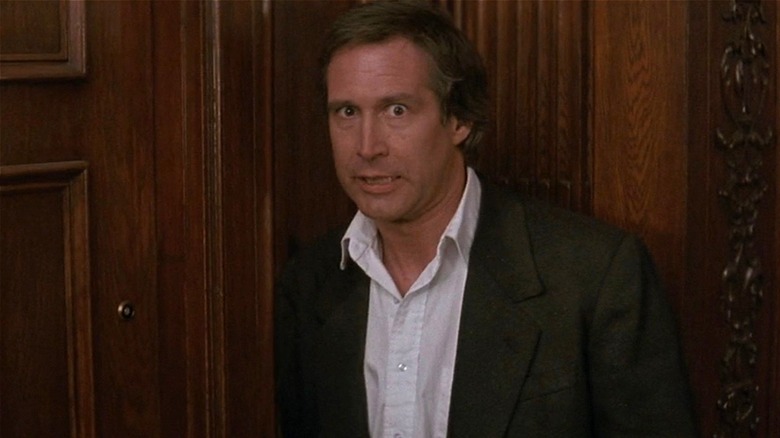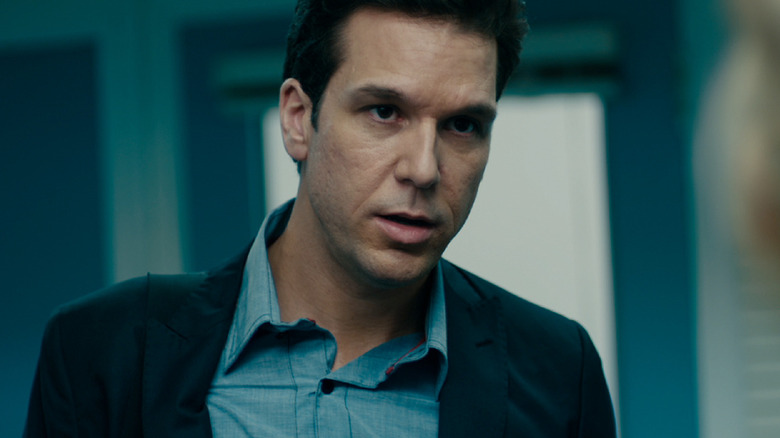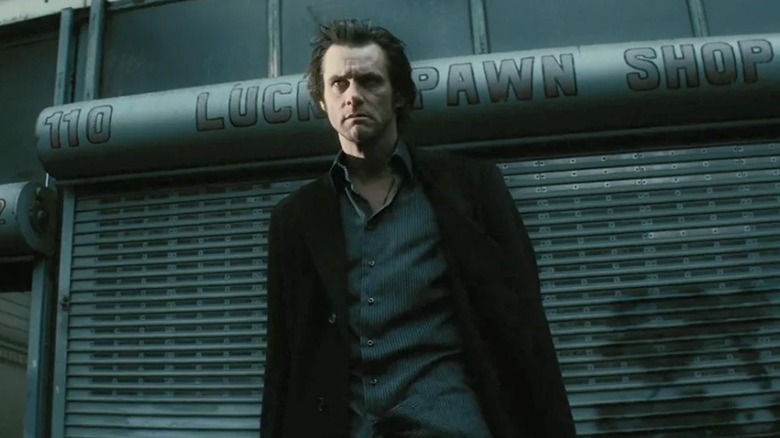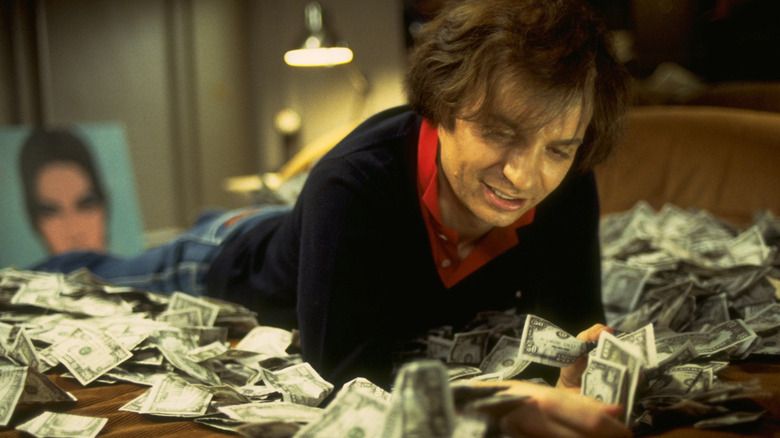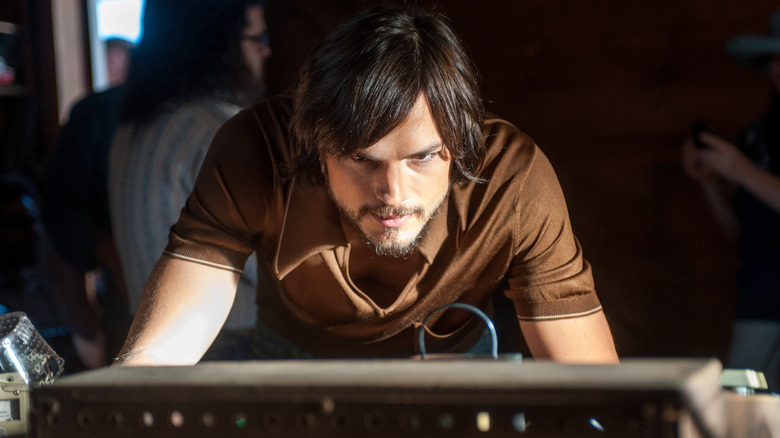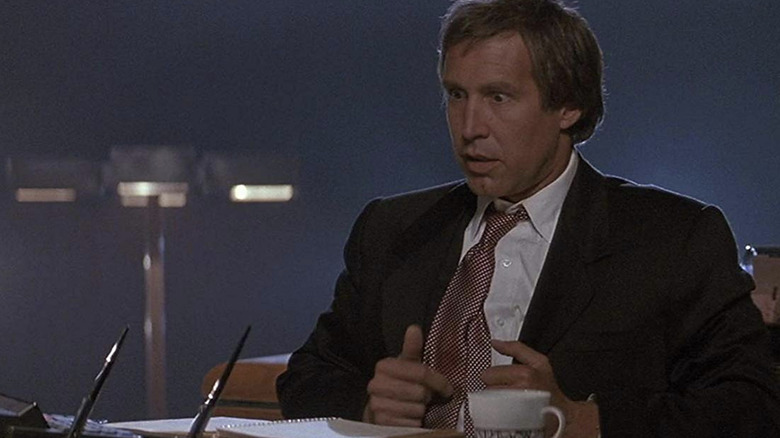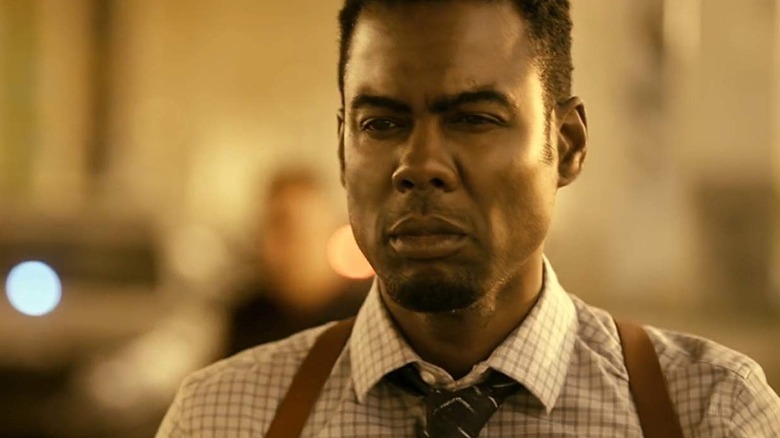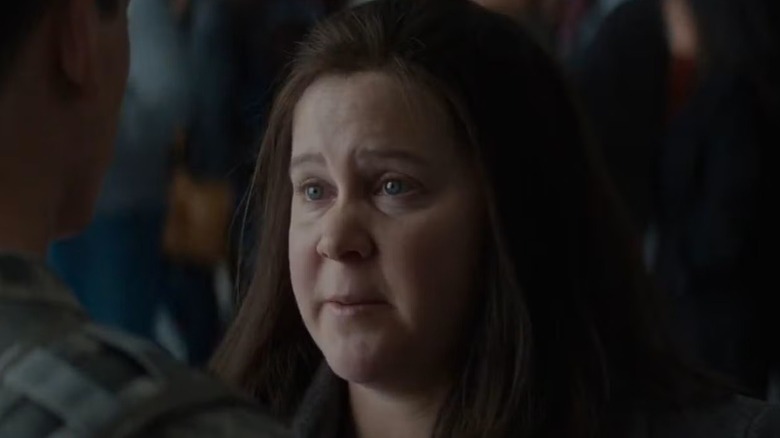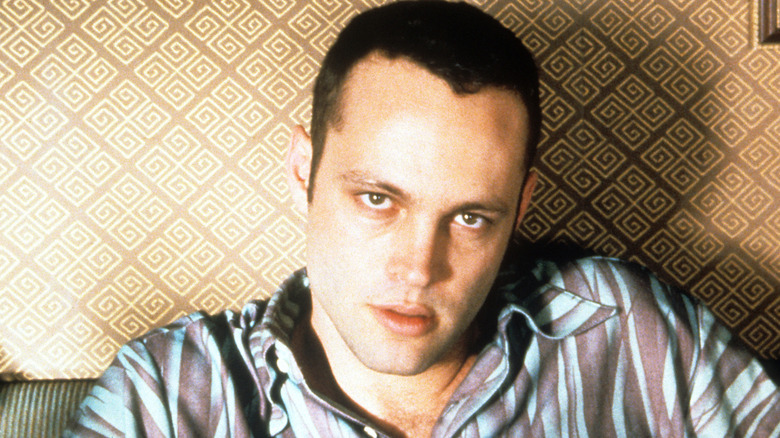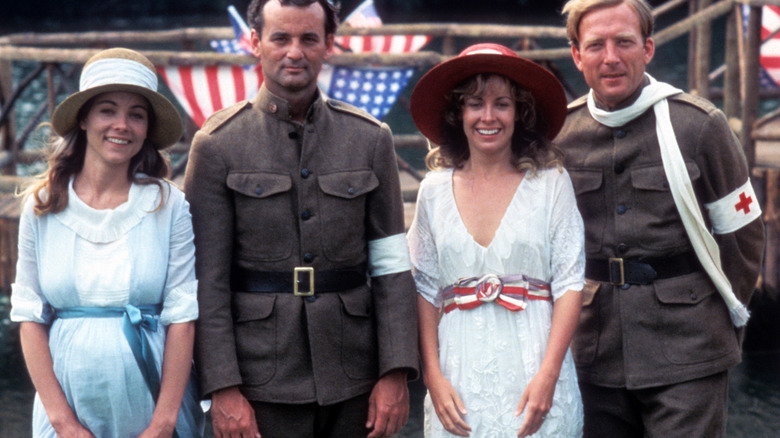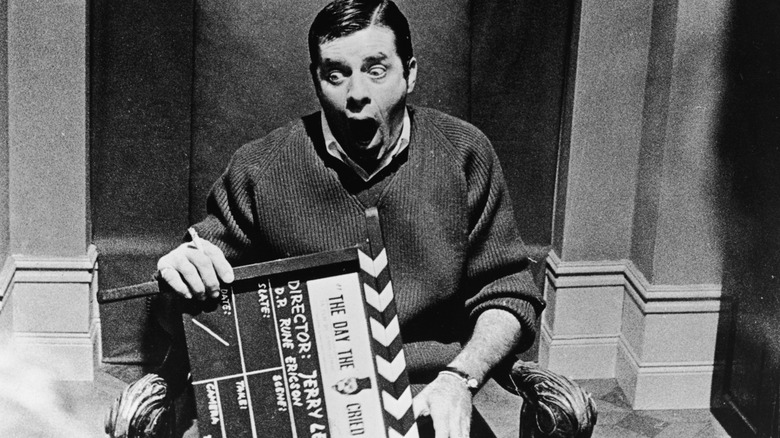Comedians Who Tried Acting In Serious Films But Failed
There have been plenty of times comedy actors surprised us with a serious role. It's easy to assume that someone is only good at comedy if that's all they've done, so when a funny person gets serious on screen and is great at it, it can certainly be jarring. That being said, there are endless quotes that say some variation of comedy being a lot harder than drama — so if someone is great at the harder thing, it stands to reason they can handle the easier thing.
Yet, as we all know, that is very often not the case. Sometimes a comedian, or an actor who made a name for themselves with comedic roles, completely misses in their big dramatic swing. To be clear, we aren't taking about just the movie itself failing. These are specifically times when the comedic actor's performance betrayed their overall talent, and didn't show off their range in the way they hoped it would.
Some of the actors on this list had indeed proved their dramatic chops prior to these examples, or would later atone for these dramatic missteps with far better performances. But a couple of them, well — let's just say there's a reason why this was either their only dramatic role, or is thus far their last one.
Dane Cook - Answers to Nothing
Dane Cook burned bright hot for a couple of years in the 2000s, helped tremendously by being one of the first stand-up comedians to really embrace the burgeoning world of social media. As it often goes when a comedian's popularity blows up quickly and is connected to a very specific moment in pop culture, the backlash against Cook came hard and fast. After a few marginally successful movies, his budding film career as a leading man was also effectively dead as the decade drew to a close.
Among the ways Cook tried to stay relevant as his fame began to wane was to take on more dramatic acting work. He already had a role in the tepidly-received "Mr. Brooks" in 2007, and though he was overshadowed by co-stars Kevin Costner, William Hurt, and Demi Moore, Cook's performance was just good enough to get by. But when he attempted to play one of the main leads in a dramatic film, 2011 thriller "Answers to Nothing," it was painfully obvious that he didn't have the chops to carry the ensemble of a serious movie.
Granted, the movie itself was abysmal, which didn't help matters, but review after review called out Cook's acting in particular and had nothing but scathing remarks about it.
Jim Carrey - The Number 23
When Jim Carrey started down the road of becoming one of the highest paid actors of all time, the groundwork was laid with the 1994 hat trick of "Ace Ventura: Pet Detective," "The Mask," and "Dumb and Dumber" — three of the absolute silliest comedies of the decade. And though he would tone done some of the slapstick-heavy, rubber-faced antics of those movies over the next couple of years, he still largely remained in the realm of comedy until 1998's acclaimed "The Truman Show" proved that he had no trouble doing drama.
Carrey spent the rest of the '90s and the first half of the 2000s going back and forth between funny and serious, including the 2004 surreal romance masterpiece "Eternal Sunshine of the Spotless Mind." With that in mind, nobody could've imagined that, just three years later, Carrey would make his worst movie in any genre with "The Number 23."
The numerology-focused psychological thriller not only scored an embarrassing 7% on Rotten Tomatoes, but critics were universally shocked at how the same Carrey from "The Truman Show" and "Eternal Sunshine" turned in such an awful performance in the film. Peter Travis of Rolling Stone declared it 2007's worst star vehicle and said Carrey's performance in the movie was the most unintentionally funny of any film that year.
Mike Myers - 54
Before his stint on "Saturday Night Live" had even ended, Mike Myers had already announced himself as a big screen comedic talent with his 1992 film debut "Wayne's World." Myers not only starred in but also co-wrote the well-received film, based around characters that he created. He did the same, only handling writing duties all on his own, five years later with "Austin Powers: International Man of Mystery."
With all that in mind, Myers was at the peak of his powers in 1998 — which he saw as the perfect opportunity to take his first stab at a dramatic acting role. And that role was playing real-life businessman Steve Rubell in the movie "54," which loosely tells the story of troubled NYC nightclub Studio 54 which Rubell co-owned. Unfortunately for Myers, it wouldn't end up being the start of a secondary career as a serious actor. Not only was "54" both a major critical and commercial disappointment, but Myers' performance in the movie was called out for coming off a bit too much like an exaggerated "SNL"-esque sendup of Rubell rather than an effective portrayal of the controversial figure.
It's worth noting that some have suggested the role was negatively affected by studio interference and recuts, and the eventual release of the director's cut of "54" had many people giving a positive reappraisal of both the movie itself and Myers' performance in it. But there's no denying that the initial negative reactions to the film and his performance scared Myers off from ever doing any major dramatic roles ever again.
Ashton Kutcher - Jobs
Ashton Kutcher got famous as lovable goofus Michael Kelso on "That '70s Show" and the host of MTV celebrity prank show "Punk'd." He went on to play a fairly similar character — something that felt halfway between Kelso and the persona of himself he put forth on "Punk'd" — across his first batch of movies, mostly a mix of rom-coms and manchild romps. While Kutcher took occasional detours into other genres, the 2004 psychological thriller "The Butterfly Effect" was the only noteworthy non-comedy he did for the first decade of his movie career. And he did fine in that, nothing embarrassing, but nothing to really elevate his craft, either.
It was in 2013, when Kutcher took on the titular role of Apple wunderkind Steve Jobs in "Jobs," that the actor seemed to be announcing his arrival as a true capital-a actor. But even though there were still two years before Michael Fassbender's superior portrayal in "Steve Jobs" existed to compare it to, Kutcher's take on Jobs was given a mixed reception at best. R. Kurt Osenlund of Slant was not a fan, writing, "Everything Kutcher does rings false, including the preposterous glares he adopts for Jobs's 'I mean business' face." And in his review for The Telegraph, Sebastian Doggart called it a "disastrous decision" to cast Kutcher in the role, saying that was "where the film completely falls down."
One of the Jobs actors got an Oscar nomination, the other got a Razzie nomination. We'll let you figure out which was which.
Chevy Chase - Memoirs of an Invisible Man
Any discussion of actors everyone hates working with inevitably has Chevy Chase's name come to the fore. The "Saturday Night Live" alum and longtime "National Lampoon's Vacation" franchise patriarch is at the center of story after story of difficult, volatile, and downright toxic behavior on film and TV show sets — stories that the actor not only rarely refutes, but even occasionally wears like a badge of honor. Chase gave filmmaker John Carpenter such a rough time during the making of 1992's "Memoirs of an Invisible Man" — in which Chase plays a stock broker who becomes literally transparent after a laboratory mishap — that Carpenter said he nearly walked away from Hollywood altogether over the whole fiasco.
Was the end product at least worth the misery it gave Carpenter? Not remotely. The high concept dramedy thriller was a box office bomb and critical disappointment, not surprising given that it was an extremely troubled production that had Chase constantly pushing to make the movie be his big dramatic debut that everyone else seemed insistent on turning into a comedy.
This push and pull went on for years until the muddled mess of a final product managed to limp past the finish line, a movie that isn't sure if it wants to be funny or serious — and leaving the world unconvinced that Chase was up for the task whenever things leaned into the latter category. A path to more dramatic roles the "Memoirs of an Invisible Man" disaster was not.
Chris Rock - Spiral
1990 was a big year for the career of Chris Rock. The most obvious reason for that was his joining the cast of "Saturday Night Live," which made Rock a household name after a few years of building his stand-up career and playing very small roles in a handful of films. But it was also the year he filmed "New Jack City," the acclaimed crime drama that was primarily a leading man vehicle for Wesley Snipes but also featured the first dramatic role for Rock. Rock played Benny "Pookie" Robinson, a petty criminal who becomes a crack addict over the course of the film, a performance that Roger Ebert called "effortlessly authentic and convincing."
Rock would primarily lean into comedy for the bulk of his quite prolific acting career, occasionally dabbling in serious roles — and typically handling them just fine — but rarely taking on anything dramatic as a major lead character. Though it falls at the bottom of all of "Fargo's" five seasons ranked worst to best, Rock's turn as crime syndicate leader Loy Cannon in Season 4 of the FX series was well-received. But his big return to drama on the big screen, the 2021 "Saw" spin-off "Spiral" — which Rock also executive produced — was anything but.
In his review for The Detroit News, Adam Graham said of Rock's performance as Detective Zeke Banks, "His acting is by far the scariest thing in the movie." Ciara Wardlow of Pajiba was similarly scathing, writing, "Perhaps it's a conscious effort to channel the non-energy of a burnt-out detective, but what Chris Rock does here instead is a burnt-out performance."
Amy Schumer - Thank You for Your Service
After making a name for herself in the world of stand-up and sketch comedy, Amy Schumer came out swinging on the big screen when she wrote her own star vehicle, "Trainwreck," in 2015. Directed by Judd Apatow, "Trainwreck" not only got universal acclaim but brought a ton of accolades Schumer's way in terms of her acting. On top of a Golden Globe nomination, film critic Richard Roeper even suggested that Schumer deserved an Oscar nomination for her performance in "Trainwreck" as well.
Perhaps because of all the positive attention she got for her acting in "Trainwreck," Schumer felt emboldened to tackle her first dramatic role only two years later in the war drama "Thank You for Your Service." Starring Miles Teller as a Staff Sergeant who fought in Iraq in 2007, the movie was very well received and particular attention was paid in most reviews to the impressive performances in the film. That is, except for the performance of Schumer, who appeared in the film as an Army widow. Many felt that her mere presence was a distraction, finding it impossible to separate her raunchy comedic persona from her attempt to give an intimate performance of a grieving woman. As for grading her actual performance, the word "flat" was used by more than one outlet.
For what it's worth, Schumer redeemed herself in the acclaimed 2021 psychological drama "The Humans," drawing her highest acting praise — in any genre — since "Trainwreck."
Vince Vaughn - Psycho
It's perhaps not entirely fair how often Vince Vaughn is told to stay in his lane — in other words, sticking to comedies — any time he ventures out into more dramatic roles. After all, his first credit film role was in the sports movie "Rudy," and he followed up breakthrough rom-com "Swingers" with a role in "The Lost World: Jurassic Park." And so it went for the first stretch of his career, bouncing around between genres and not really establishing himself as a comedy guy until the Frat Pack era of the 2000s.
That being said, it became clear pretty quickly that comedy is what Vaughn does best, and what has made up his most commercially successful projects. He isn't incapable of turning in a decent dramatic performance — but when he misfires in a serious role, he really misfires, not able to fall back on his easy charm and his signature fast-talking rants as he often does to help save the day when one of his comedies has a weak script.
An entire college film course could probably be built around the bizarre decision of director Gus Van Sant to do a shot-for-shot remake of "Psycho" in 1998, and who thought Vaughn was capable of the unsettling menace that Anthony Perkins so masterfully depicted in the 1960 original. Spoiler alert — he wasn't. When he comes out in a dress and blonde wig near the end, all the audience can do is laugh, and that is the opposite reaction you're supposed to have at the movie's iconic reveal.
Billy Murray - The Razor's Edge
Nobody needs convincing at this point that Bill Murray is a dynamite dramatic actor. In fact, over the last 30 years or so, Murray has been in as many dramedies — if not outright largely serious films — as traditional comedies. And certainly, the less-funny ones have gotten the actor more acclaim during that time. But what a lot of people don't realize is that he was interested in exploring dramatic acting way before he started making movies with Wes Anderson and Jim Jarmusch. In fact, Bill Murray agreed to star in "Ghostbusters" under one condition: That Columbia Pictures would in turn finance his very un-funny passion project.
That project was 1984's "The Razor's Edge," a historical drama based on the W. Somerset Maugham novel of the same name. While his more recent serious roles tend to have at least some comedy to them, "The Razor's Edge" saw Murray play what might still to this day be his straightest dramatic character. Audiences weren't interested, and the movie couldn't even crack $7 million at the box office. As for critics, Roger Ebert wrote in his review at the time, "Murray, who is usually such a superb actor, has taken the wrong path in this performance." Meanwhile, Paul Attanasio of The Washington Post went equally hard at both Murray's performance in "The Razor's Edge," and also the script that Murray co-wrote, saying that it all just comes together to disappoint the millions of fans Murray had amassed by that point.
In a discussing "The Razor's Edge" with Entertainment Weekly in 1993, Murray conceded, "I kind of deluded myself that there would be a lot of interest. I made a big mistake."
Jerry Lewis - The Day the Clown Cried (unreleased)
It might seem like a bit of a cheat to include "The Day to the Clown Cried" on this list. After all, star Jerry Lewis became one of the actors who single-handedly destroyed a movie when he eventually gave up fighting for the troubled Holocaust comedy. Yep, you read that right — the movie tried to mine laughs out of one of the most devastating tragedies in human history. Though the movie was in full production at one point, it was eventually abandoned due to a variety of creative conflicts, financing issues, and numerous other problems. But the project is so legendary, and it's failure so spectacular, that it still felt justified to include it in this feature.
As for Lewis himself, he was repeatedly asked about the canceled movie throughout the rest of his life. On the rare occasion he would give more than a angry shutdown of any attempts to discuss the movie, Lewis had nothing positive whatsoever to say about the movie or his work in it. One of those occasions occurred during a 2013 audience Q&A, where Lewis felt more generous than usual in sharing his thoughts on "The Day the Clown Cried." He told the crowd, "in terms of that film I was embarrassed. I was ashamed of the work, and I was grateful that I had the power to contain it all, and never let anyone see it. It was bad, bad, bad."
